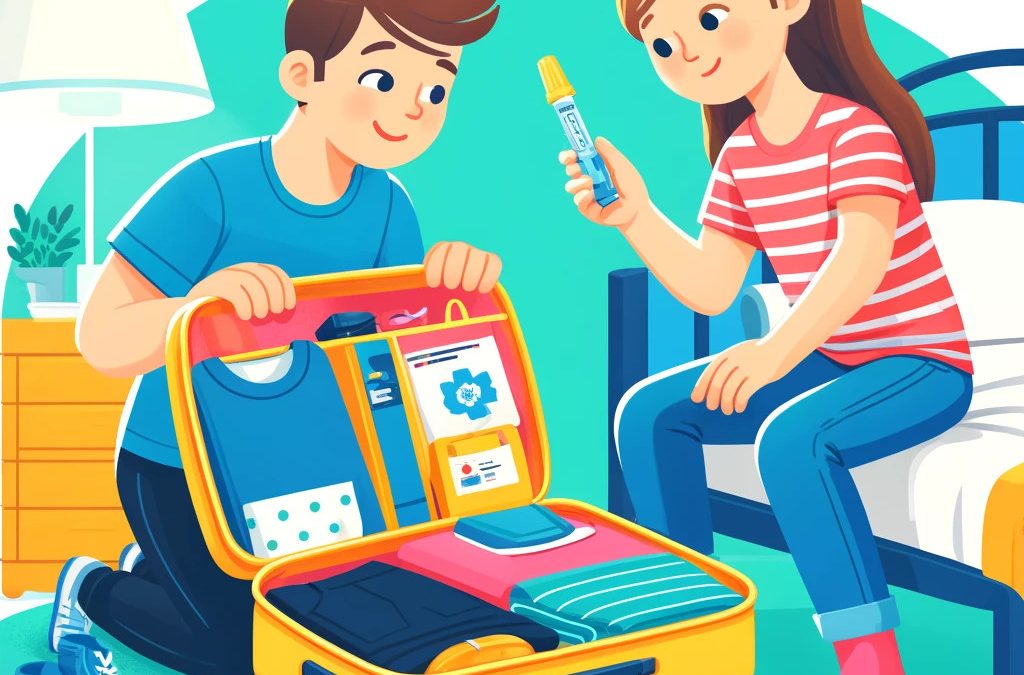Preparing for a Vacation in Europe with Food Allergies
Introduction
Traveling with food allergies can be challenging, but with careful planning, you can enjoy a safe and memorable vacation in Europe. Fortunately, most countries in Europe have coordinated regulations for food vendors and producers to label their ingredients, making them easier for people with food allergies compared to other places. This guide provides practical steps and tips to help you prepare for your trip, ensuring you can explore European destinations without compromising your health. It also includes an Essentials Checklist, and summarized EU regulations along with brief country overview.

1. Research Your Destination
Different countries in Europe have varying levels of awareness and accommodation for food allergies. Research the following aspects of your destination:
- Allergy Awareness: Check the general awareness and acceptance of food allergies in the country. Some countries, like the UK and Scandinavia, have higher levels of awareness and better food labeling practices.
- Language Barriers: Learn key phrases related to your allergies in the local language. This will help you communicate your dietary needs effectively. Apps like Google Translate can be very useful.
- Local Cuisine: Familiarize yourself with the local cuisine and typical ingredients to identify potential allergens. Some countries might use specific ingredients more commonly (e.g., nuts in Mediterranean cuisine).
2. Medical Preparations
Ensure you have all necessary medical supplies and information before you travel:
- Carry Medication: Bring enough of your prescribed medications, such as antihistamines and epinephrine auto-injectors, to last the entire trip. Pack them in your carry-on luggage.
- Medical ID: Wear a medical ID bracelet that clearly states your allergies.
- Doctor’s Note: Carry a letter from your doctor explaining your allergies and the necessity of carrying certain medications. This can be helpful at airport security and in case of emergencies.
3. Accommodation Arrangements
Choose your accommodation wisely to better manage your food allergies:
- Hotel Inquiries: Contact hotels in advance to inquire about their food allergy policies. Some hotels are better equipped to handle dietary restrictions.
- Self-Catering Options: Consider booking accommodations with kitchen facilities, such as vacation rentals or serviced apartments. This allows you to prepare your own meals and avoid cross-contamination.
- Allergy-Friendly Restaurants: Research and make reservations at allergy-friendly restaurants. Websites and apps like AllergyEats and TripAdvisor can provide reviews and recommendations.
4. Air Travel Considerations
Flying with food allergies requires extra precautions:
- Inform the Airline: Notify the airline about your allergies at the time of booking and again when checking in. Some airlines offer allergy-friendly meals and will make accommodations.
- Bring Your Own Food: Pack safe snacks and meals for the flight. Avoid relying on airline food, which may not be safe.
- Wipe Down Surfaces: Clean your seating area on the plane to reduce the risk of allergen exposure.
5. Dining Out Safely
Eating out in a foreign country can be daunting, but these tips can help:
- Allergy Cards: Carry allergy cards that explain your allergies in the local language. These can be handed to restaurant staff to ensure they understand your dietary needs.
- Communicate Clearly: Speak directly with the chef or manager when possible to explain your allergies and ask about ingredient safety.
- Be Cautious with Street Food: While tempting, street food may have a higher risk of cross-contamination. Choose established restaurants with good hygiene practices. Often, there should be previews of full menu with symbols items with particular allergens outside of established restaurants, while this may not be true with some street food vendors or in festival/fair settings.
6. Emergency Plan
Have a plan in case of an allergic reaction:
- Locate Hospitals: Identify the nearest hospitals and emergency medical facilities at your destination.
- Travel Insurance: Purchase travel insurance that covers medical emergencies, including those related to food allergies.
- Emergency Contacts: Keep a list of emergency contacts, including local emergency numbers, your doctor’s contact information, and family or friends who should be notified in an emergency.
Conclusion
Traveling in Europe with food allergies requires extra preparation, but with careful planning and the right precautions, you can have a safe and enjoyable trip. Research your destination, make medical preparations, choose safe accommodations, plan your air travel, dine out cautiously, and have an emergency plan in place. By taking these steps, you can explore Europe with confidence and peace of mind.
Travel Essentials Checklist for Individuals with Food Allergies and Allergies
Medication List
EpiPens (not common to find in some countries)
Antihistamines
Asthma Inhalers
Occasionally Used Medications (e.g., inhaled steroids, analgesics, eye drops)
Nasal Sprays (e.g., Flonase)
Medical Alert Gear
Steroid Cream
Translated Health Card (explaining medical or food allergies)
Insurance Card
Food Allergy Regulations in Europe: A Country-by-Country Overview
Summary
Across Europe, the general trend is towards stringent allergen labeling on packaged foods and clear communication of allergenic ingredients in restaurants. The EU regulations serve as a baseline, with individual countries sometimes adding their own specific requirements. Ensuring that people with food allergies have access to the necessary information is a priority, and businesses are typically required to provide this information in a clear and accessible manner. Regardless, you and your family should be prepared to use translation aid to request allergen information in case the staff does not understand English very well, and in the case that the English version of the information is unavailable or inadequate.
European Union (EU) General Regulations
The EU has established comprehensive regulations regarding food allergies that member states must adhere to:
- Food Labeling: The EU Food Information for Consumers Regulation (EU FIC) mandates that 14 allergens, including nuts, gluten, and shellfish, must be clearly labeled on pre-packaged food products.
- Restaurant Menus: Restaurants, cafes, and other food service providers must provide information on allergenic ingredients used in non-prepackaged food. This can be communicated through menus, labels, or other documentation.
United Kingdom
The UK follows similar regulations to the EU with additional specific guidelines:
- Natasha’s Law: Effective from October 2021, this law requires all food businesses to include full ingredients labeling on pre-packaged food prepared for direct sale, with allergens emphasized.
- Menu Information: Restaurants must provide allergen information in writing, ensuring customers can easily access it without needing to ask staff.
France
France has stringent requirements for both packaged and unpackaged food:
- Food Labeling: French regulations mandate the clear labeling of the 14 allergens on all packaged foods.
- Restaurant Menus: Restaurants must inform customers about allergens present in their dishes. This information is typically available in written form, either on the menu or via a separate document.
Germany
Germany follows EU regulations with specific practices for effective communication:
- Food Labeling: The 14 allergens must be clearly indicated on all packaged foods.
- Menu Information: Restaurants often provide allergen information through menu symbols or separate allergy cards. Staff are trained to handle inquiries about allergens.
Italy
Italian regulations emphasize transparency and customer safety:
- Food Labeling: Clear labeling of the 14 allergens is mandatory on all packaged food products.
- Restaurant Menus: Restaurants are required to provide detailed allergen information. This is often done through annotated menus or information booklets available upon request.
Spain
Spain has robust regulations to protect individuals with food allergies:
- Food Labeling: Packaged foods must clearly list any of the 14 allergens if they are present.
- Restaurant Menus: Restaurants must disclose allergenic ingredients used in their dishes. This information is usually provided on menus or through verbal communication by well-informed staff.
Sweden
Sweden ensures clear communication about allergens both in stores and eateries:
- Food Labeling: All packaged foods must label the presence of any of the 14 allergens.
- Menu Information: Restaurants are required to provide allergen information, typically available in written form. Swedish establishments often have dedicated allergen-friendly options.
Netherlands
The Netherlands focuses on comprehensive allergen information:
- Food Labeling: Packaged food products must list any of the 14 allergens.
- Restaurant Menus: Food service providers must inform customers about the presence of allergens, usually through menus, brochures, or direct communication.
Greece
Greece follows EU regulations and has specific measures to ensure food safety for individuals with allergies:
- Food Labeling: All packaged food products must clearly label the 14 allergens identified by the EU, including common allergens such as nuts, gluten, and dairy.
- Restaurant Menus: Greek restaurants are required to provide information about allergens in their dishes. This is often included on menus or available through separate allergen information sheets. Staff are typically trained to handle allergen inquiries and provide necessary information.
Portugal
Portugal aligns with EU regulations and emphasizes clear communication and labeling:
- Food Labeling: Packaged foods must list any of the 14 allergens. This information must be clearly visible and easily understandable.
- Restaurant Menus: Restaurants and other food service establishments in Portugal must inform customers about the presence of allergens in their dishes. This information is usually available on menus or through specific allergen guides that customers can request.
Switzerland
Switzerland, though not an EU member, has similar stringent regulations to ensure food safety for those with allergies:
- Food Labeling: Swiss regulations require clear labeling of the 14 main allergens on all packaged food products. The Swiss Ordinance on Foodstuffs and Utility Articles aligns closely with EU standards.
- Restaurant Menus: Restaurants must provide detailed information about allergens present in their dishes. This information is often available on menus or through special allergen information cards. Staff training is essential to ensure that they can answer questions about allergens and provide accurate information.

